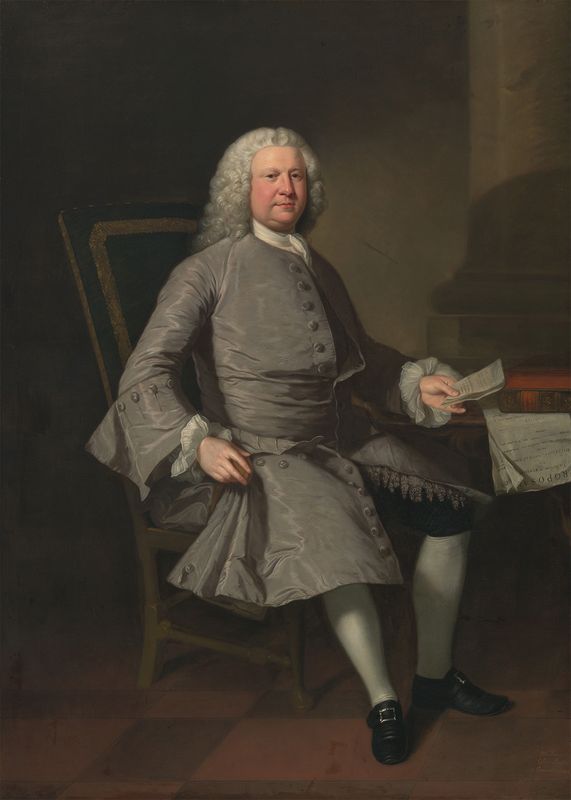Thomas Osborne II (1704?–1767; fl. 1738–1767)

Identifiers
- Grubstreet: 8483
Occupations
- Bookseller
- Publisher
- Book Auctioneer
Names
- Thomas Osborne II
- Thomas Osborn
Thomas Osborn II, bookseller and publisher in Gray's Inn.
A Dictionary of the Printers and Booksellers who were at Work in England, Scotland and Ireland from 1668 to 1725, by Henry Plomer (1922)
OSBORNE (THOMAS), bookseller in London, Gray's Inn [son of Thomas at Gray's Inn near the Walks ...], bought the Harleian Library and employed Oldys and Johnson to catalogue it; his relations with the latter have made him much better known than his father, who was nevertheless one of the leading publishers of his time. [D.N.B.]
Notes & Queries "London Booksellers Series" (1931–2)
OSBORNE, THOMAS II. Son and successor of above [Thomas I]. He seems to have started business in 1738. He died in 1767, and the stock of Thomas Osborne of Gray's Inn was sold by auction 28 July of that year. A good account of him is given in the 'D.N.B.' though it errs in attributing a share in the publication of Richardson's 'Pamela' to this man, whereas this was due to John Osborn (see above). In the list of London publishers 1737–43, mentioned in 'Works of the Learned,' occurs "T. Osborne and W. Smith of Gray's Inn." No other reference to this partnership has been found, nor any indication as to which of the T. Osbornes this applies to.
—Ambrose Heal, 21 November 1931
A Dictionary of the Printers and Booksellers who were at work in England, Scotland and Ireland from 1726 to 1775, by Henry Plomer et al. (1932)
OSBORNE (THOMAS), bookseller, publisher, and book-auctioneer in London, Grays Inn, 1738–67. Son and successor of Thomas Osborne (1702–43). He has been variously described as "coarse, dull, and uneducated", and as "a very respectable man". Pope sneered at him in The Dunciad. Johnson said he was impertinent and knocked him down with a folio. On the other hand, a well-known Nonconformist minister employed him as a publisher and spoke well of him. On the whole, perhaps the Rev. Thomas Toplady was of a more charitable frame of mind than either Johnson or Pope. Osborne succeeded to a good business and he improved it. Nichols says that "he filled one side of Gray's Inn with his lumber, and without knowing the intrinsic value of a single book, contrived such arbitrary prices, as raised him to his country house, and dog and duck huntings". [Nichols, III. 625.] If we may judge by his acts, Osborne knew a good deal more than some of his fellow tradesmen gave him credit for. At any rate he secured the valuable library of Edward Harley, Earl of Oxford, in 1742, for the sum of £13,000. He sold this again in February 1744. He took considerable care in the preparation of the catalogue and secured Dr. Johnson to write the Proposals and compile the first volume. He incurred the jealousy and enmity of the trade by making a charge for the catalogue and for putting what they considered too high a price on the books. Dibdin, in his Bibliomania, spoke of Osborne as "the most celebrated bookseller of his age, and gave it as his opinion that his charges were "extremely moderate". His correspondence was by no means that of an uneducated man, and his handwriting was small and neat. Thomas Osborne died in 1767, his will being proved on August 26th. It is of little interest. He left his house in Warwick Court to his wife, and he owned other premises in Paved Court, Fulwood's Rents, Holborn, in which he kept part of his stock. He left no heir, and desired that his business should be sold to pay his legacies. To the Benchers of Gray's Inn he bequeathed a ring each. [P.C.C. 315, Legard.]
J. Michael Treadwell Research Notes (1999)
Thomas Osborne, senior and junior, of Gray's Inn. The older man was dead by 1743; Thomas Osborne, junior, died in 1767. The younger man is best known as the purchaser of the Harleian Collection. Father and son ran an enormous used book shop, and they were frequent advertisers in the major daily and weekly newspapers of the period. Additional information about the Osborn(e)s may be found in Sale, Richardson, pp 332–34. The John Osborn reported by Nichols as dying in 1739 (Sale, p 333) must be still another John Osborn; it cannot be any of the ones I have listed here.